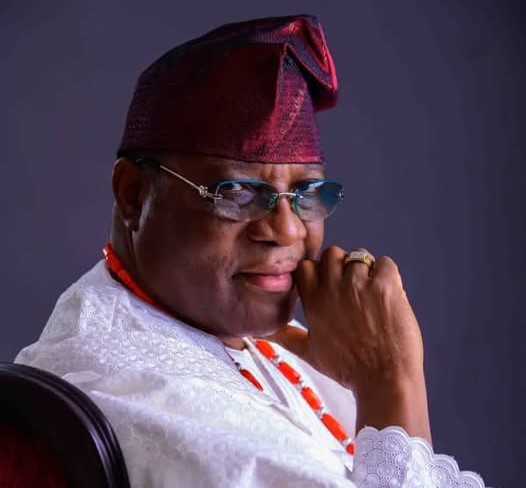By Sanya Onayoade
I met Otunba Dr. Felix Babatunde Obada as a Gentleman in the real sense of that designation: Personable, friendly, humble, urbane and charismatic. That was 2002 in the build-up to Nigerian elections which his wife, my own godmother, Erelu Olusola Agbeja Obada contested. He was the coordinator of his wife’s Osun Governorship project dubbed God’s Own Project. He was also the Intercessor, if you like, Prayer Warrior, for the political ambition, and his prayers were plenteous and fervent. He was then the Managing Director of Materials Management Services Limited, a company he co-owned with his wife. He was an incurable optimist and any endevour he went into, he put his whole being and spirit. He strongly believed his wife would become the Governor of Osun State, and true to his conviction, Erelu was the leading PDP candidate until party leaders weighed in, sermonising that Osun might not be ready for a female governor at that time. That was how a non-contender, Olagunsoye Oyinlola, who was content with senatorial ambition was drafted into the governorship race. Erelu Olusola Obada then became the Deputy Governor.
Apart from his optimism that he displayed throughout his life, he was also a strong believer in the Nigerian Project, and had implemented a couple of landmark pioneering initiatives in this direction. In 2004, he co-founded Nigerian eGovernment Strategies Limited (NeGST), a Special Purpose Vehicle (SPV) with the mandate to facilitate, drive and implement the Nigerian eGovernment Programme under a Public Private Partnership (PPP) model. He was the Managing Director while Dr. Olu Agunloye was the Executive Vice Chairman. He also founded Global Biofuels Limited, a pioneer in the renewable energy sector of the economy, an initiative aimed at converting the juice from the stalk of sorghum to ethanol. That project was meant to reduce the pressure on fossil fuel and give affordable fuel to Nigerians.
Dr. Obada was part of the team that successfully engineered the entrance of Nigeria into the space age by facilitating the design and launch of Nigeria’s first Satellite (NigeriaSat-1) in conjunction with the Federal Ministry of Science & Technology and the University of Surrey.
He brought me into NeGST in 2005 as the communications manager, and it was exhilarating being in that space: an entity that would automate government functions and services, enable interoperability across ministries and agencies and eliminate, or reduce bureaucracy and corruption. There were eState, eLocalGoverment, eParliament, eMillitary, eJudiciary, eRevenue, ePayment, eKiosk, eTourism, eProcurement, eAuthentication, eHealth, eForm, eImmigration, some of which were being built into SBUs (Small Business Units). ePassport was a precursor of today’s advancement in passport procurement being enjoyed by Nigerians.
So enthusiastic was I that I proposed to him to write a book on eGovernment, while I volunteered to be a researcher/writer, so that Nigerians could be better educated about service offerings of eGovernment that was already a trending venture in the advanced world. We started the book but never got it completed when I left the company in 2007 due to a bitter leadership tussle between him and Dr. Olu Agunloye, who was a former Minister of Power and Steel.
The fight that grounded the company operations to a halt gave me a peek into the tough skin of the suave Obada. It was a time corporate prayers were a staple in the office. Dr. Agunloye viciously cut off funding for the company, and by extension, salaries and key operational expenses. He even refused to recognise some staffers. Yet, Dr. Obada carried on with stoical courage.
I arranged several media facility visits for the duo, some of which were ignored by Dr. Agunloye; did my bit in the brand management of the company and kept away negative media as petitions between the combatants who hailed from the same Akoko area of Ondo State, flew around. Dr. Obada tried to boost staff morale, and we could see him jostling many places, Abuja especially, to source funding. He once asked me to speak to a billionaire friend of mine if he could invest in the company. We could see and feel his pains, and sometimes got some reprieve whenever his wife, the Osun Deputy Governor came visiting the office.
He was not one to exploit the official privilege of his wife or hang around the corridor of power in Osun State. Some staff once advised if he could get a bailout from the Osun State government, he declined, preferring to maintain a distant dignity.
I was fond of hanging out with the Obada family, both in their Lekki house and the Deputy Government house in Osogbo. Whenever I visited, chilled wine, which he served personally, was always at my beck and call. And you dare not say, you were not eating. He was a wine connoisseur, and a fantastic host of visitors. He just made you feel at home irrespective of your status.
It was always fun-time whenever we spent weekend with his wife, the Deputy Governor in Osogbo; and he would always poke those of us from Osun State that we snatched his wife from him, that he had to come to Osogbo to see her. But Otunba was credited with the political success of Erelu Olusola Obada, who also later became the Minister of Defence. He was the pillar behind her and the spiritual head of her political machine.
For a woman to be a successful politician is not a stroll in the park. She was an adorable Amazon, but a toughie nonetheless; and could be impulsively impatient to inanities or unintelligent rigmarole. In this wise, Otunba was the tempering factor. While Erelu was hyper restless and spontaneously explosive, Otunba was calm, studious with the disposition of a sage.
This humanist, with a genial nature will be sorely missed. Adieu Otunba Dr. Babatunde Felix Obada.


